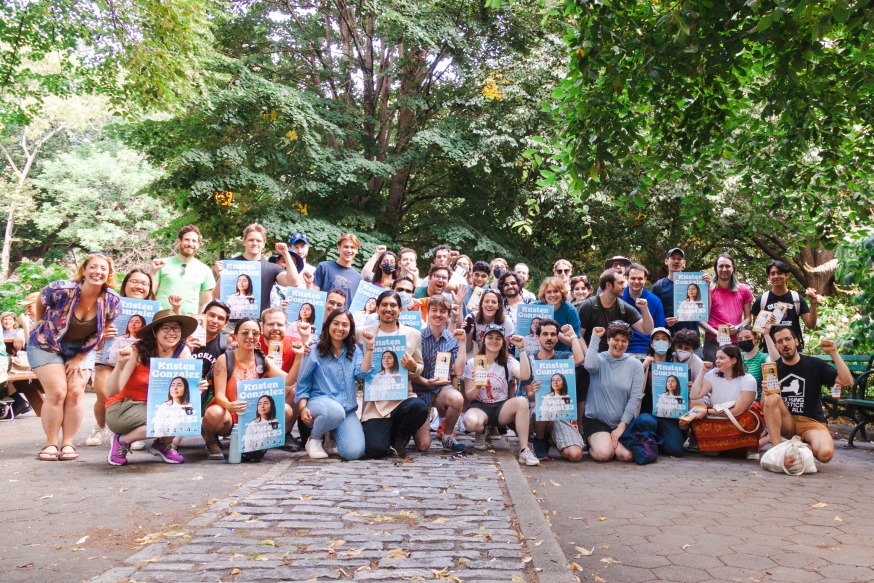
Kristen Gonzalez campaign launch (Photo: Kristen Gonzalez for NY)
Aug. 15, 2022 Op-Ed By Kristen Gonzalez, Candidate for State Senate District 59
If you walk into a courtroom and watch arraignments in any New York City borough, you will see person after person brought before the judge suffering from mental illness, experiencing homelessness, or both. It is estimated, for example, that over half of the people held at Rikers suffer from a diagnosable mental illness.
This sad reality exists because New York treats the criminal legal system as a catch-all. We face a housing crisis that has displaced thousands of our neighbors, a pandemic that has exacerbated mental illness, and a nationwide rise in certain types of crime and fear. But the police, the courts, and Rikers Island remain the primary point of intervention for people suffering from mental illness or extreme poverty.
The legal system is overburdened — it is not meant to be the tool we use to address every social problem we face. But by failing to provide alternate services we have created a cycle where people shuffle back and forth between the courthouse, jails, and the streets without ever receiving care.
It is, in a word, unsafe. And keeping our neighbors safe and our communities intact is exactly why I’m running to represent the new District 59 in Albany as a State Senator.

Kristen Gonzalez, Candidate for State Senate District 59 (Photo: Kristen Gonzalez for NY)
Real public safety depends on building intervention points before someone is sent to arraignments or to Rikers (which faces its own mounting mental health crisis and overdose crisis). That makes last month’s launch of the national 988 mental health hotline so exciting.
The service allows people to text, call, or online chat trained crisis counselors to respond to people experiencing mental health, substance use, or suicide crises. These responders – deployed instead of the police – are better-equipped to provide treatment and prevent dangerous behavior.
New York state is spending $60 million on the launch of the service. That’s a good start, but providing successful offramps to the overburdened criminal legal system demands more.
The sputtering start of a similar city-specific program, B-HEARD, is instructive: the program had a successful pilot but since it launched, it has failed to deploy counselors in nearly 85 percent of its calls due to understaffing and sent police instead.
For 988 to succeed, New York must invest more, and passing Daniel’s Law (named after Daniel Prude, who was killed by police responding to his mental health crisis) will help us build necessary mental health emergency infrastructure.
Beyond emergency response, we must also provide treatment backed by meaningful investment for people both inside and outside of the criminal legal system. As a State Senator, one of my priorities would be passing the Treatment Not Jail Act, sponsored by fellow DSA member Phara Souffrant Forrest, which expands eligibility for mental health and drug court diversion programs for people who need and would benefit from that type of treatment rather than jail.
Rikers Island is one of the largest mental health providers in the country. But jail is hardly a treatment environment, and every month people held in the complex miss thousands of medically-necessary appointments. Instead, community-based supportive housing provides stability at critical junctures in people’s lives, building public safety.
It costs $556,000 a year to jail someone in New York City, but it costs just $42,000 per person annually to provide supportive housing that provides treatment and stable housing. We must support ongoing investment in these critical programs.
New York should also invest in crime reduction programs with a track record of success. Community Violence Intervention (CVI) programs work to prevent violence before it happens. They employ community members with lived experience with gang and gun violence to mentor and build relationships with young people at high risk, and dissuade them from engaging in violence. New York has already begun to invest in these programs, and they show promising returns: one program dropped recidivism by about 70 percent.
CVI programs are a boon for municipal coffers, too. For every dollar invested in them, cities can save up to $18 in reduced medical and criminal legal system costs. Frustratingly, this year’s city budget did not expand investment in CVI programs despite the obvious need and their proven success, but I will push to expand New York State’s investment in gun violence prevention when in Albany.
The crises we face are real and daunting, but our public safety toolbox is deep. To date we have narrowly invested in only a small sliver of it, and asked our police, courts, and jails to be all things to all people. True public safety rests on moving beyond such small thinking, to make robust investments in programs tailored to the problems our communities face. We can keep our streets safe, help our neighbors in need, and make New York a model for the rest of the nation.
Kristen Gonzalez is a Long Island City resident and candidate for State Senate District 59. Senate District 59 covers Long Island City, Astoria, Greenpoint, Williamsburg, Murray Hill, Kips Bay and Stuyvesant Town.
